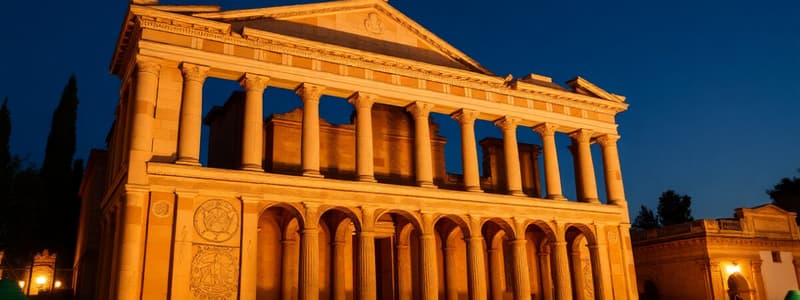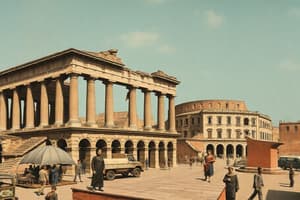Podcast
Questions and Answers
What model does the Roman constitution provide for modern democracies?
What model does the Roman constitution provide for modern democracies?
The Roman constitution serves as a foundational model by exemplifying principles of justice, fair treatment, and effective governance.
Name two aspects of Etruscan civilization that were inherited by the Romans.
Name two aspects of Etruscan civilization that were inherited by the Romans.
Romans inherited the practice of human blood sports and the belief in auguries from Etruscan civilization.
How does the myth of Romulus and Remus convey deeper truths about Rome's founding?
How does the myth of Romulus and Remus convey deeper truths about Rome's founding?
The myth emphasizes themes of power, destiny, and sacrifice, illustrating Rome's emergence through both divine intervention and human struggle.
What is the significance of Pliny the Younger’s Epistolae in understanding the eruption of Mount Vesuvius?
What is the significance of Pliny the Younger’s Epistolae in understanding the eruption of Mount Vesuvius?
What revolutionary approach did Giuseppe Fiorelli introduce to archaeological excavations at Pompeii?
What revolutionary approach did Giuseppe Fiorelli introduce to archaeological excavations at Pompeii?
How did Roman society reflect principles of justice as derived from their constitution?
How did Roman society reflect principles of justice as derived from their constitution?
In what way did the she-wolf in the myth of Romulus and Remus symbolize the ideals of Rome?
In what way did the she-wolf in the myth of Romulus and Remus symbolize the ideals of Rome?
What role did auguries play in Roman and Etruscan societies?
What role did auguries play in Roman and Etruscan societies?
What did the Fiorelli Process involve and what was its significance in understanding the victims of Pompeii?
What did the Fiorelli Process involve and what was its significance in understanding the victims of Pompeii?
How did the Romans interpret omens, and what were some examples of signs they considered significant?
How did the Romans interpret omens, and what were some examples of signs they considered significant?
What is augury and how was it practiced in Roman society?
What is augury and how was it practiced in Roman society?
Describe the authority and responsibilities of the paterfamilias within a Roman family unit.
Describe the authority and responsibilities of the paterfamilias within a Roman family unit.
What role did women play in Roman society, and what freedoms did they enjoy post-marriage?
What role did women play in Roman society, and what freedoms did they enjoy post-marriage?
What was the significance of haruspicy in Roman religious practices?
What was the significance of haruspicy in Roman religious practices?
What were some common household superstitions in Roman culture, and what did they signify?
What were some common household superstitions in Roman culture, and what did they signify?
How did the role of the paterfamilias affect inheritance and family lineage in Rome?
How did the role of the paterfamilias affect inheritance and family lineage in Rome?
Flashcards are hidden until you start studying
Study Notes
The Study of Roman Civilization
- Romans applied justice based on evidence, which has influenced modern legal systems.
- Roman architecture, engineering, and administration are studied for their practical achievements and influence on modern society.
- The Roman Constitution, based on principles of justice and fair treatment, serves as a model for modern democracies.
Etruscan Influence on Roman Civilization
- The Romans adopted Etruscan numerals, which formed the basis of Roman numerals.
- Etruscan influence on Roman culture included blood sports, belief in Hades, and a strong reliance on magic and spells, evident in divination practices like augury and haruspicy.
The Myth of Romulus and Remus
- The myth is a metaphoric story conveying themes like power, destiny, sacrifice, and the importance of religion and spirituality.
- The she-wolf symbolizes strength, survival, and nurturing in the myth.
- The conflict and murder of Remus symbolize the sacrifices and violence necessary for the birth of a new order, and emphasizes the importance of unity and control in leadership.
Pliny the Younger and the Eruption of Mount Vesuvius
- Pliny the Younger's Epistolae provide a first-hand account of the eruption of Mount Vesuvius in 79 AD, which destroyed Pompeii and Herculaneum.
- He describes the events from Misenum, including the tragic death of his uncle, Pliny the Elder, a renowned naturalist, author, and naval commander.
The Importance of Giuseppe Fiorelli and the Fiorelli Process
- Giuseppe Fiorelli, an Italian archaeologist, revolutionized archaeological methods at Pompeii, emphasizing preservation, documentation, and scientific approach.
- He developed a grid system for the site and introduced the Fiorelli Process to create plaster casts of victims, capturing their final moments and humanizing the tragedy.
Superstition in Roman Beliefs
- Romans were highly superstitious, believing in omens like lightning, earthquakes, and unusual animal behavior.
- Augury – interpreting the will of the gods through bird behavior
- Haruspicy – examining the entrails of sacrificed animals, especially the liver, for signs of divine displeasure.
- Household Superstitions included avoiding thresholds, spilling salt, and carefully disposing of nail and hair clippings to avoid curses.
The Paterfamilias and the Roman Family Unit
- The Paterfamilias (father of the family) held absolute power over his wife, children, and slaves.
- He had authority to discipline, abuse, or even kill members of his household.
- His role was defined by potestas (power), gravitas (conservatism), dignitas (status), and servitas (obedience to law).
- He passed on property to a male heir, either biological or adopted.
- He was responsible for recognizing newborn children.
Women in Roman Society
- Women's primary roles were marriage and childbirth.
- They typically married at 15, enjoying some freedom within the household.
- They could shop, conduct business, and attend social events with their husbands.
- Women were educated alongside boys up to a certain age.
- They were expected to be obedient to their husbands, but were not entirely without influence within the family.
Studying That Suits You
Use AI to generate personalized quizzes and flashcards to suit your learning preferences.



